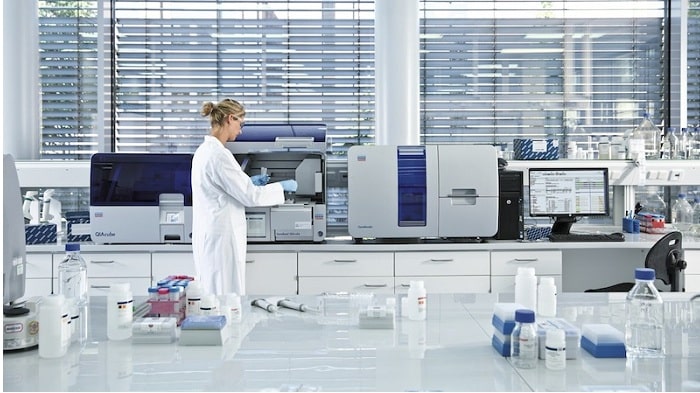QIAGEN announced the launch of novel solutions enabling faster, better analysis of genomic variations in cancer – accelerating multiple applications of Precision Medicine. QIAGEN is showcasing its broad portfolio of Sample to Insight solutions for cancer in connection with the 2020 American Society of Clinical Oncology (ASCO) Annual Meeting, being held virtually from May 29-31.
Among the highlights:
The new QCI Interpret One software solution joins the QIAGEN Clinical Insights (QCI) portfolio, which has been used to analyze and interpret next-generation sequencing (NGS) data from 1.6 million clinical cases to date. QCI Interpret One enables molecular pathologists to more rapidly and confidently deliver clinically relevant reports designed to improve patient outcomes based on complex genomic testing data.
The new QIAseq Pan-cancer Multimodal (1.44 Mb, 605 gene) panel for comprehensive genomic profiling (CGP) of solid tumors and heme malignancies leverages the unique QIAseq Multimodal technology which begins with a total nucleic acid extraction, followed by simultaneous preparation of DNA and RNA libraries. The Pan-cancer panel enables the detection of DNA and RNA aberrations, known and unknown RNA fusions in addition to assessment of TMB and MSI status in multiple samples types from a single sample input.
QIAGEN has launched the novel QIAseq Targeted Methyl panels, the first and only NGS-based products for targeted methylation analysis with the increased analytical sensitivity and sequence-targeting capabilities of the company’s proprietary Single Primer Extension technology. The solutions offer faster one-day workflows and data analysis pipelines for predesigned and custom-tailored panels in a full range of cancer applications, designed specifically for low-input samples including liquid biopsy and FFPE.
“While we serve the world’s needs for testing tools in the COVID-19 pandemic, QIAGEN also continues to deliver cutting-edge molecular solutions for cancer research and improving patient outcomes. We are fully engaged with customers in oncology, making the most of digital technologies and virtual settings such as the 2020 ASCO Annual Meeting,” said Thierry Bernard, Chief Executive Officer at QIAGEN. “Our new QCI Interpret One clinical decision support software solutions, QIAseq Pan-cancer Multimodal and QIAseq Targeted Methyl panels provide oncology researchers with valuable tools and additions for variant interpretation, liquid biopsy applications as well as comprehensive genomic profiling (CGP) and biomarker discovery. They create true Sample to Insight solutions for a variety of oncology research applications.”
Expanding QIAGEN Clinical Insights portfolio
The release of QCI Interpret One adds an important solution to the QIAGEN Clinical Insights portfolio, the clinical decision support software platform for germline, hereditary cancer and somatic interpretation and decision support. QCI Interpret One delivers variant- and disease-specific evidence for every variant in any somatic panel, backing each classification with the latest peer-reviewed publications, oncologist-reviewed interpretation summaries, and an “expert second opinion” for confident variant classification.
“The job of the molecular pathologist is more challenging than ever for variant interpretation. This is why it’s important to have access to the latest and best variant interpretive data,” said Dr. Ravindra Kolhe of Augusta University in Augusta, Georgia. “QIAGEN’s new QCI Interpret One is impressive. It combines the former N-of-One interpretation summaries with QIAGEN’s QCI Interpret structured variant interpretation database. No one is better than QIAGEN for Variant Interpretation. From a large complex panel you can quickly filter variants, classify variants according to AMP and NCCN guidelines and add disease specific and oncologist reviewed pre-formulated interpretive comments. The depth, breadth and quality quickly gives you the confidence you need when there is so much information and complexity to deal with now.”
Expanding QIAseq portfolio for multimodal applications and liquid biopsy
The new QIAseq Pan-cancer Multimodal panel for comprehensive profiling of solid tumors and heme malignancies, which enables simultaneous preparation of DNA and RNA libraries, and comprehensive detection of SNPs, indels, CNVs and RNA fusions in addition to assessment of TMB and MSI status from a single total nucleic acid sample input.
Designed to support the growing demand for workflow and assay consolidation, the QIAseq Multimodal technology enables not only the consolidation of two separate NGS-based DNA and RNA variant profiling workflows into one, but also enables scalable and parallel interrogation of up to thousands of targets in one enrichment step in one single tube. Ideal for comprehensive genomic profiling (CGP) and biomarker discovery, this 1.44 Mb panel consists of more than 600 target genes and fusions involved in the onset, progression, and treatment response across different cancer types, as well as microsatellite instability (MSI) markers, is complemented by an efficient workflow that significantly reduces hands-on and turn-around time from sample to sequencing from a typical 2-3 day workflow down to a single day.
Additionally, the innovative QIAseq Targeted Methyl panels provide valuable insights into DNA methylation, a biological process active in cancers that can modify the function of genes and affect gene expression. These flexible solutions offer faster one-day workflows and data analysis in predesigned panels for breast and colorectal cancer, immuno-oncology and T-cell infiltration (expected later in 2020), plus rapid, online custom design capabilities to create tailored panels for customer-specific applications.
About QIAGEN
QIAGEN N.V., a Netherlands-based holding company, is the leading global provider of Sample to Insight solutions that enable customers to gain valuable molecular insights from samples containing the building blocks of life. Our sample technologies isolate and process DNA, RNA and proteins from blood, tissue and other materials. Assay technologies make these biomolecules visible and ready for analysis. Bioinformatics software and knowledge bases interpret data to report relevant, actionable insights. Automation solutions tie these together in seamless and cost-effective workflows. QIAGEN provides solutions to more than 500,000 customers around the world in Molecular Diagnostics (human healthcare) and Life Sciences (academia, pharma R&D and industrial applications, primarily forensics). As of March 31, 2020, QIAGEN employed approximately 5,100 people in over 35 locations worldwide.


















